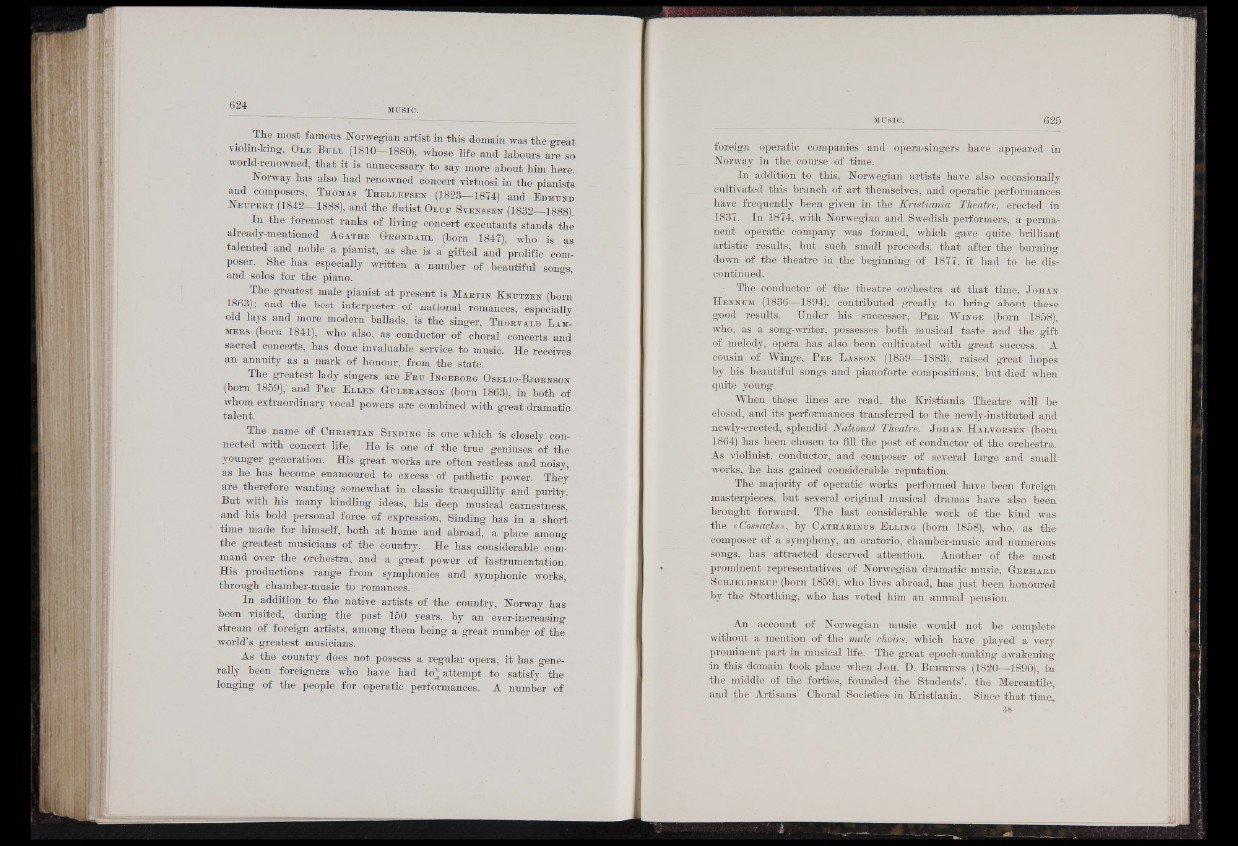
The most famous Norwegian artist in this domain was the great
V9 p i n g | ° LE Bule (1810-1880), whose hfe and labours are so
world-renowned, that it is unnecessary to say more about him here.
Norway has also had renowned concert virtuosi in the pianists
and composers, T h o m a s T h e l l e e s e n (1823-1874) and E d m u n d
N e u p e e t (1842 1888), and the flutist O l t je S v e n s s e n (1832—1888).
In the foremost ranks of living concert executants stands the
already-mentioned A g a t h e G e o n d a h l (born 1847), who is as
talented and noble a pianist, as she is a gifted and prolific composer.
She has especially written a number of beautiful songs
and solos for the piano.
The greatest male pianist at present is M a b t in K n u t z e n (born
1863); and the best interpreter of national romances, especially
old lays and more modem ballads, is the singer, T h o b v a d d L a m -
m e b s (born 1841), who also, as conductor of choral concerts and
sacred concerts, has done invaluable service to music. He receives
an annuity as a mark of honour, from the state.
The greatest lady singers are E b u I n g e b o b g O s e e io -B jo b n s o n
(bom 1859), and E b u E l l e n G u l b b a n s o n (bom 1863), in both of
whom extraordinary vocal powers are combined with great dramatic
talent.
The name of C h b i s t i a n S in d i n g is one which is closely connected
with concert life, He is one of the true geniuses of the
younger generation. His great works are often restless and noisy,
as he has become enamoured to excess'of pathetic power. They
are therefore wanting somewhat in classic tranquillity and purity.
But with his many kindling ideas, his deep musical ■ earnestness,
and his bold personal force of expression, Sinding has in a. short
time made for himself, both at home and abroad, a place among
the greatest musicians of the country. He has considerable command
over the orchestra, and a great power of instrumentation.
His productions range from symphonies and symphonic works,
through chamber-music to romances.
In addition to the native artists of the country, Norway has
been visited, during the past 150 years, by an ever-increasing
stream of foreign artists, among them being a great number of the
world’s greatest musicians.
As the country does not possess a regular opera, it has generally
been foreigners who have had to^ attempt to satisfy the
longing of the people for operatic performances. A number of
MUSIC.
foreign operatic companies and opera-singers have appeared in
Norway in the course of time.
In addition to this, Norwegian artists have also occasionally
cultivated this branch of art themselves, and operatic performances
have frequently been given in the Kristiania Theatre, erected in
1837. In 1874, with Norwegian and Swedish performers, a permanent
operatic company was formed, which gave quite brilliant
artistic results, but such small proceeds, that after the burning
down of the theatre in the beginning of 1877, it had to be discontinued.
The conductor of the theatre orchestra at that time, J o h a n
H e n n u m (1836—1894), contributed greatly to bring about these
good results. Under his successor, P e e W in g e (born 1858),
who, as a song-writer, possesses both musical taste and the gift
of melody, opera has also been cultivated with great success. A
cousin of Winge, P e e L a s s o n (1859;—1883), raised great hopes
by his beautiful songs and pianoforte compositions, but died when
quite young.
When these lines are read, the Kristiania Theatre will be
closed, and its performances transferred to the newly-instituted and
newly-erected, splendid National Theatre. J o h a n H a l v o e s e n (born
1864) has been chosen to fill the post of conductor of the orchestra.
As violinist, conductor, and composer of several large and small
works, he has gained considerable reputation.
The majority of operatic works performed have been foreign
masterpieces, but several original musical dramas have also been
brought forward. The last considerable work of the kind was
the «Cossacks», by C a.t h a b in u s E l l i n g (born 1858), who, as the
composer of a symphony, an oratorio, chamber-music and numerous
songs, has attracted deserved attention. Another of the most
prominent representatives of Norwegian dramatic music, G e b h a b d
S c h j e l d e b u p (born 1859), who lives abroad, has just been honoured
by the Storthing, who has voted him an annual pension.
An account of Norwegian music would not be complete
without a mention of the male choirs, which have played' a very
prominent part in musical life. The great epoch-making awakening
in this domain took place when J o h . D. B e h b e n s (1820—1890), in
the middle of the forties, founded the Students’, the Mercantile,
and the Artisans’ Choral Societies in Kristiania. Since that time,